MLB team wants sports gambling revenue to fund stadium upkeep
When the Supreme Court struck down a ban on sports gambling in May, it opened the doors for states to legalize it. West Virginia, Delaware, Mississippi, New Jersey and Pennsylvania are currently in the process of making sports betting legal.
As a result, teams have been looking for ways to get in on the action.
Several universities, including UConn, Rutgers and Missouri, are advocating for fees to be paid to their schools from gambling revenue as compensation for rising compliance costs to maintain a clean program.
In New York, a similar “integrity fee” was proposed by pro sports leagues so that they could better police betting activities in their sports to prevent scandals. This was struck down.
Sports leagues have also argued that they should get a “royalty fee” from sports betting, claiming stats used in gambling are the intellectual property of the sports, thus the fee. But this argument has also been shot down, reports Forbes, as recent Supreme Court cases have established that stats are not intellectual property of the leagues.
Taxpayers who made it clear 20yrs ago that they didn’t want to give the Steelers and Pirates Money for stadiums were forced to give them $1/2 Billion. Now the Pirates want gambling tax revenue to pay for PNC Park maintenance. Should be laughed out of town.https://t.co/S7yCKjSJgC
— John Steigerwald (@Steigerworld) June 21, 2018
But in Pennsylvania, the Pittsburgh Pirates have come up with a new tactic. They are seeking a cut of sports gambling revenue to keep up with maintenance of their ballpark.
If that sounds like a stretch, well it is. But they laid out their case in a letter to the Pennsylvania Gaming Control Board.
Here are portions of the letter, published by Legal Sports Report, that articulate the team’s reasoning.
“On a local team level, the Pirates are obviously one the handful of professional sports organizations that will be most directly affected by any new regulations in Pennsylvania. We think it is important to note that any revenue generated through sports wagering is largely dependent on organizations like the Pirates who actually supply the sports wagering product,” the letter to the gaming board states, according to Legal Sports Report.
Here’s the windup:
“Without professional sports there can be no professional sports betting. Providing a professional sports product is a costly endeavor. While our landlord is responsible for capital repair and improvements at PNC Park, the Pirates are responsible for maintenance and operational expenses at PNC Park, which has consistently been named the premier ballpark in the country since its opening in 2001…”
And the pitch:
“We have been engaged in constant dialogue over the past five to seven years with city, county and state officials about the need allocate a funding source to the capital needs of PNC Park,” the team said. “It stands to reason that a portion of the revenue collected from sports wagering should be allocated to the maintenance and capital upkeep of PNC Park and the other sports-based facilities in Pennsylvania which provide for sports wagering in the first place. We are concerned that no such provision is included in the current law or the regulation.”
This is almost like racetracks wanting pari-mutuel handle to pay for purses and operating expenses. https://t.co/tBtbQ0KYrJ
— Ray Paulick (@raypaulick) June 26, 2018
PNC Park, which opened in 2001, was largely paid for with public money. The Pirates funded about $44 million of the $262 million pricetag with the rest coming from state and local funding.
Sports betting revenue is not tax dollars, but still, that’s quite an ask.
The Pirates will likely strikeout in this effort, especially in the court of public opinion. But you can bet every other professional team will be ready and willing to ask for something similar if the Pirates are successful in their request.
Truth and Accuracy
We are committed to truth and accuracy in all of our journalism. Read our editorial standards.
Advertise with The Western Journal and reach millions of highly engaged readers, while supporting our work. Advertise Today.












